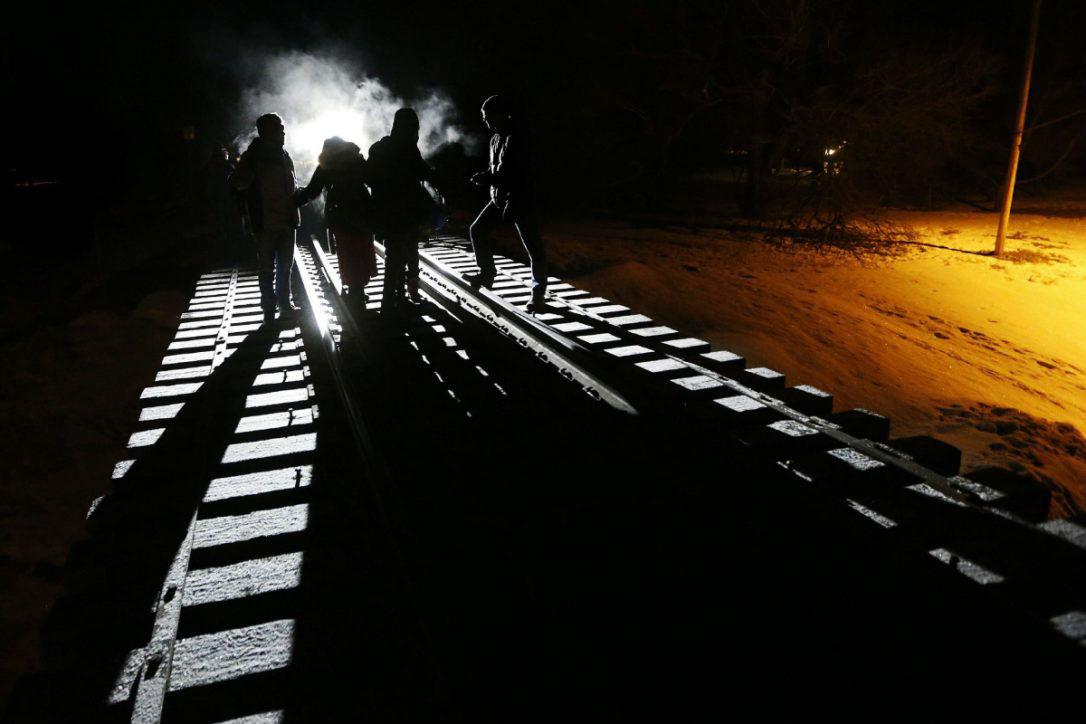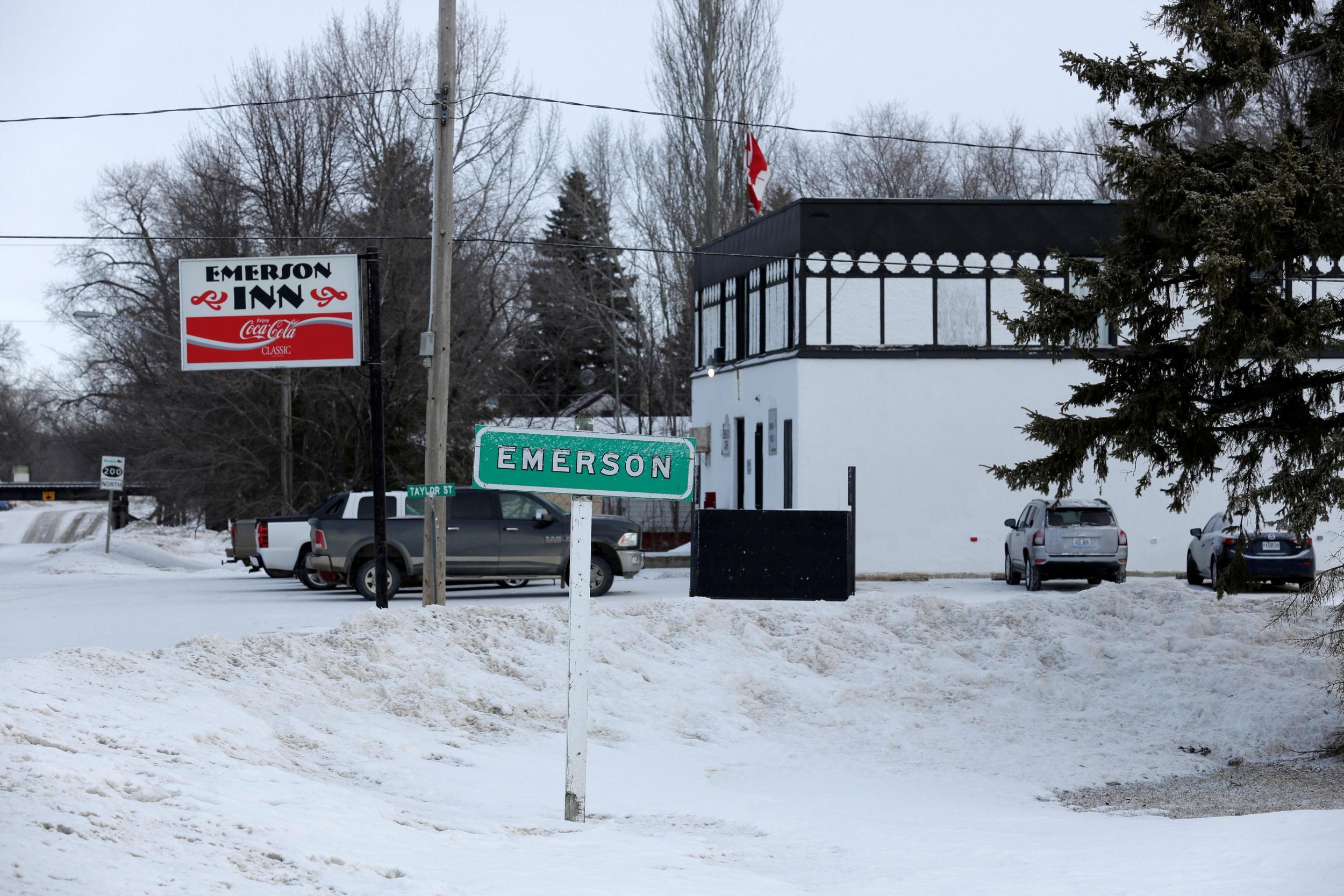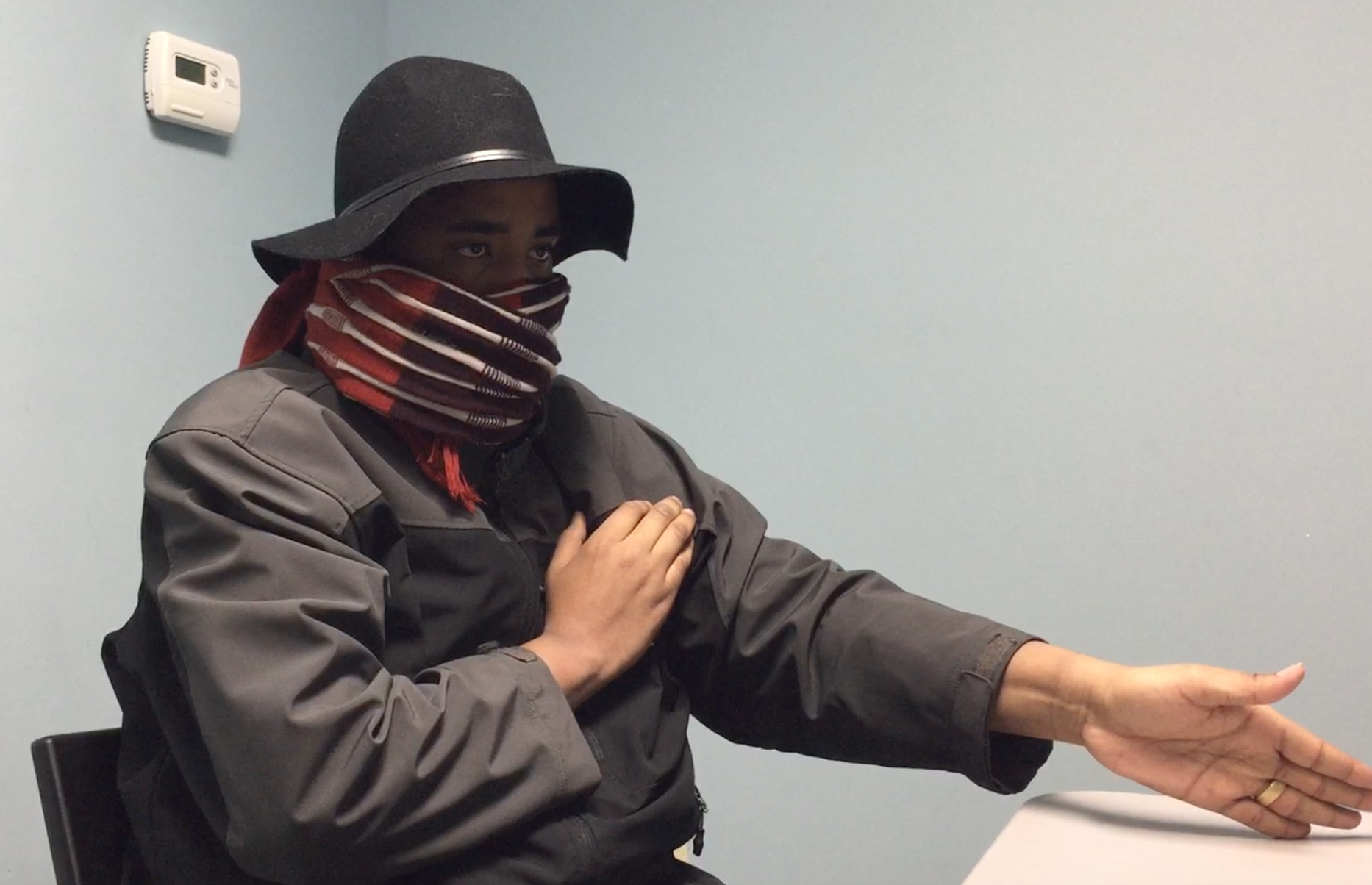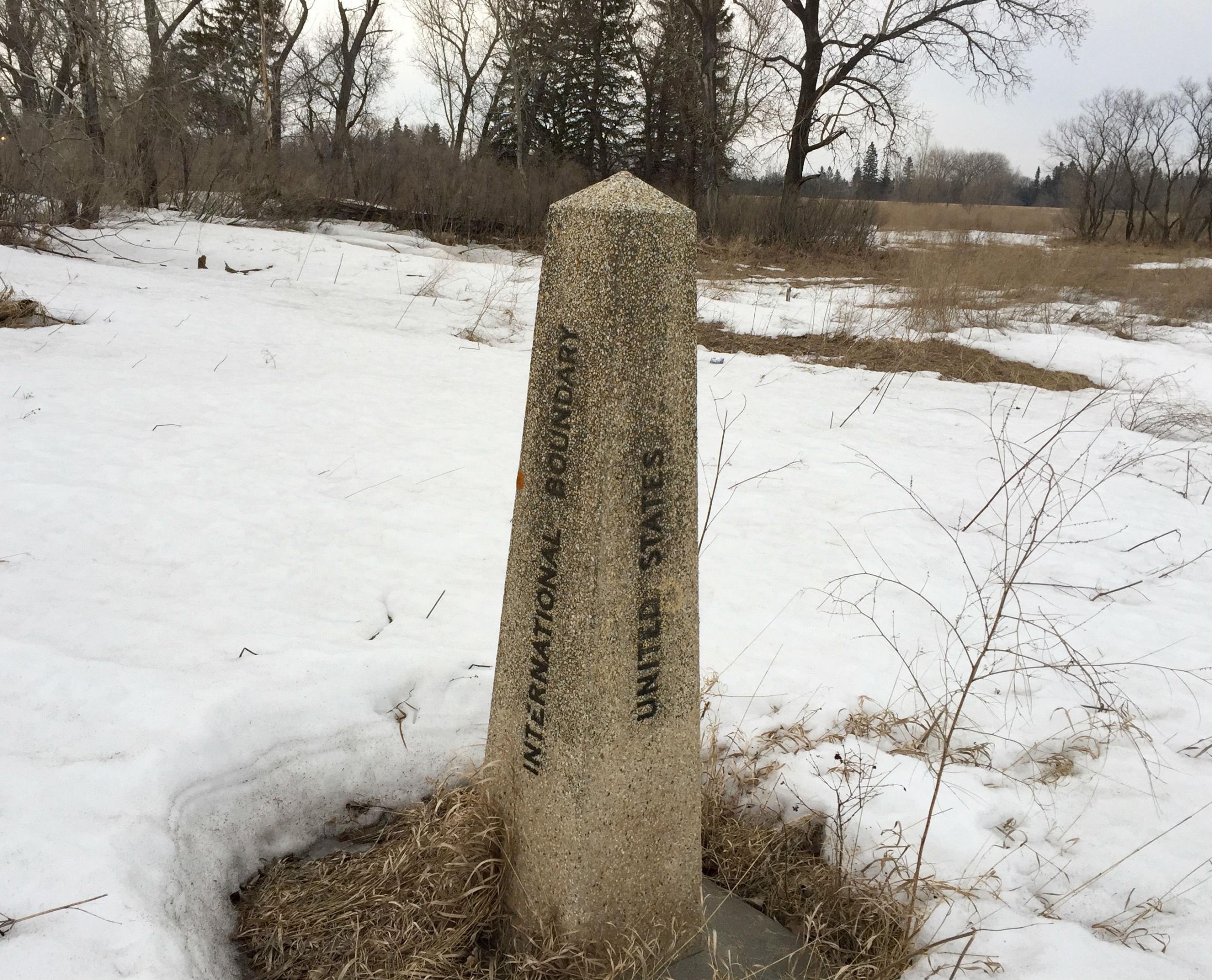Welcome to Emerson, the tiny Canadian border town where hundreds of refugees have fled from Trump's America
People are risking their lives in blizzards and sub-zero temperatures
Your support helps us to tell the story
From reproductive rights to climate change to Big Tech, The Independent is on the ground when the story is developing. Whether it's investigating the financials of Elon Musk's pro-Trump PAC or producing our latest documentary, 'The A Word', which shines a light on the American women fighting for reproductive rights, we know how important it is to parse out the facts from the messaging.
At such a critical moment in US history, we need reporters on the ground. Your donation allows us to keep sending journalists to speak to both sides of the story.
The Independent is trusted by Americans across the entire political spectrum. And unlike many other quality news outlets, we choose not to lock Americans out of our reporting and analysis with paywalls. We believe quality journalism should be available to everyone, paid for by those who can afford it.
Your support makes all the difference.They cross at night, trudging for hours through the winter freeze over fields that stretch to the horizon.
They come alone, in pairs, or in groups of 17, their breath clouding the dark air. There are old men and pregnant women, and a toddler being carried in the arms of its mother. All make the crossing in the hope of a better life.
Since the election of Donald Trump, the Canadian border town of Emerson has become the frontline in a new international immigration controversy. Fearful of being deported under the President’s crackdown on undocumented migrants, hundreds of people are crossing north to Canada, where the youthful and media savvy Prime Minister, Justin Trudeau, has sought to welcome them.

In the first three months of 2017, the Royal Canadian Mounted Police arrested 1,134 migrants – the same as for all of 2016. As spring arrives and the crossing becomes less perilous, that number is likely to rise.
“We’ve had four cross this week – a Somali, a Honduran, someone from El Salvador, and even an American,” said Frank Suderman, manager of the Maple Leaf Motel, located a hundred yards from the border.
“It’s always at 2am or 5am. They knock on the door. You never know. We’ve always had people crossing, but never this many.”
The people of Emerson, population 650, say they have done all they can to help those crossing illegally. Some have provided hot coffee and meals, others are members of the town’s volunteer fire department, which turns out in all weathers to help people lost or stuck in a blizzard before handing them over to the immigration authorities.
Some, such as Mr Suderman, have washed blankets used by the emergency teams and which get covered in the thick, black fertile mud that has made the area one of Canada’s most important farming regions.
And in a province whose nickname is Friendly Manitoba, people are proud of a tradition of welcome and hospitality. Many have little time for Mr Trump and his actions.

At the same time, among some residents, frustration is growing. They say Mr Trudeau has offered almost no financial support to meet their humanitarian role, while others wish those entering the country would follow the official procedure.
“I just wish people would come here legally. We’ve been an open country,” said Johanne Kehler, who works as a cook in Emerson and lives in neighbouring Letellier. “If they came in legally, it would be better.”
Locals refer to what they say is a “legal loophole”. Under an agreement with the US, any migrant approaching an official Canadian border crossing will be turned back if they have already made a refugee claim in America.
However, if they are able to set a foot on Canadian soil, they are allowed to stay and make a separate asylum claim.
Emerson sits on the 49th parallel, a circle of latitude that for 2,175 miles designates the border between five US states and four Canadian provinces. Located on the Red River, and at the junction of North Dakota and Minnesota, the town has for more than 200 years been a border community, and dealt with everything that has come with such status.
While the border between the US and Canada is designated by marker posts, some more than a hundred years old, hardly any of it is fenced. Cattle, wildlife and people can walk straight across.
On the US side of the border, in both North Dakota and Minnesota, The Independent was able to follow country roads that led directly to the unfenced border, some located just a few hundred yards from the official crossing point. It would have been a simple thing to have hopped across.
“It was never really a problem. Normally, both countries have had respect, but that respect has gone out of the window,” said Doug Johnston, a town councillor and volunteer with the fire department, as he pointed out the town’s limits, where Canada ends and the US begins.
Mr Johnston said many in Emerson felt they were at the centre of an international push-and-pull, with Mr Trump doing the pushing and Mr Trudeau responsible for the pulling.
“I feel, yes, they are crossing illegally,” he said. “But when a mother and a child are coming in winter, it shows their desperation.”
Officials say the majority of those crossing are from Somalia and other African countries. More recently, people have been arriving from Latin America and Haiti.
“This has been going on forever,” said Jean-Nicolas Beuze, Canada representative of UNHCR, the United Nations refugee agency. “But the numbers have increased since November.”

He declined to speculate that the election of Mr Trump was the reason for the increase. “It’s very hard to a have a long term view,” he said.
Those who work with migrants wish that people focussed on the individuals and the circumstances that led them to cross, rather than simple numbers.
Rita Chahal runs the Manitoba Interfaith Immigration Council in the provincial capital, Winnipeg. It provides emergency accommodation and legal advice to new arrivals.
Since the recent increase in the number of migrants, Ms Chahal has been subjected to racist abuse on social media. The Council has had to employ security guards around the clock. It does not publicise the location of its accommodation centre.
Ms Chahal said it was only correct that people were concerned about the safety of Canada’s border and those entering. But she said there were effective professional organisations such as the police and immigration services, dealing with any threat. People were thoroughly screened before they were allowed to make an asylum claim.
She said she had urged the media to stop focussing on simply the number of people coming. “You have to have the human faces.”
Among those faces is Muhammad, a 30-year-old businessman and interpreter from Somalia, who entered the US illegally in December 2015, having left Mogadishu six months earlier. His journey involved travelling to the Bahamas where he paid $5,000 (£4,000) to a “coyote” to take him by boat to the south east of Florida.
He was arrested upon arrival, detained and ordered to be deported, then released as he sought to make a claim for asylum based on the lawless and frequently deadly nature of life in Somalia.
He said that on 22 January 2017, he learnt that around 100 Somalis had been deported as part of Mr Trump’s crackdown, and he decided to try and make it to Canada.
Sitting in a room in the NGO’s accommodation, asking that he not be fully identified or his face shown, Muhammad said he crossed into Emerson as part of a group of ten people on the night of 19 March.
Having paid for a ride to a town in North Dakota, he walked for more than an hour before the Canadian authorities picked them up.
“We were freezing. We could not feel our hands,” he said. Officials in Emerson had treated them “very nicely”, in stark contrast, he said, to how he was treated in the detention centre in the US.
“I was in detention and they just treat you like a criminal. I am not a criminal,” said Muhammad, whose wife, child and mother are still in Somalia.
Asked if he thought Mr Trump had any insight about the situation in his country, where he said his family was recently threatened by the extremist group Al-Shabaab, he said the New York tycoon had talked of Somali pirates during the election campaign.

“During the campaign, he said he hates Muslims. He said Somalia was one of the countries he does not like. He is racist,” he said. “He talked about pirates – that is not everyone in the country.”
He said he hoped now to be able to attend college in Canada. If his claim for asylum is successful, he would like to sponsor his wife and child. He said he had been able to speak to them and let them know he had made it.
In Emerson, Jackie Reiner opened Little J’s Cafe six weeks ago in a room attached to a hotel. She and her partner named it for the nicknames given to their two children.
In the weeks the cafe has been open, it has been packed every morning with locals and outside contractors, drinking coffee and eating breakfast. On a recent morning, the room was full of conversation about the people crossing the border. There was a mixture of sympathy and concern.
Ms Reiner is one of the residents who has appeared frequently on local television, outlining the situation – both local and much broader – in clear and precise terms.
“I feel for these people because they have nowhere to go,” she said. “They have no idea what they’re walking into – it’s minus 30C. They must be desperate at that point. There is no sane person who would put themselves through that otherwise.”
She believed the problem facing Emerson could be solved if the US and Canada spoke to each other. She pointed out that many countries in the world were struggling to deal with the problem of immigration. Why were they not pooling expertise and experience?
She said the issue motivating people such as Muhammad, and those just known by a number or the shorthand of a nationality, was not going to go away. Many were fleeing authoritarian regimes, or war zones.
“I would have grabbed my kids months ago and run, with the threats they are getting from Trump and other countries,” she said. “They don’t want to go back where they’re from. Trump is threatening they’re going to be deported: you run.”
* Video production by Tom Goulding and Charlie Atkin

Join our commenting forum
Join thought-provoking conversations, follow other Independent readers and see their replies
Comments